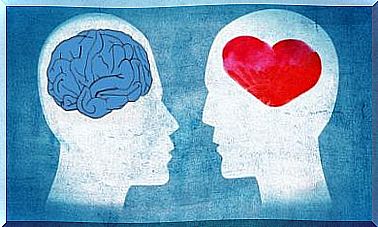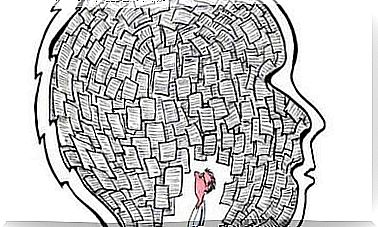Delirium In Alzheimer’s Disease

Alzheimer’s disease is the leading cause of dementia. Thus, deterioration in cognitive functions appears to be the core of the symptoms of this disease. However, other symptoms can also play an important role and reduce the patient’s quality of life. This is how delirium occurs in some of those affected.
This neurocognitive disorder is characterized by changes in perception and attention. Usually this is the psychological consequence of a physiological complication. In addition, however, Alzheimer’s disease is associated with a degenerative process characterized by the loss of cholinergic neurons. These are important for the proper functioning of the brain.
Delirium is a clinical disorder that also affects attention and perception, but also affects consciousness. However, its pathogenesis is so far only incompletely understood. Although cognitive deterioration and dementia have been systematically identified as major risk factors for delirium, the mechanisms that contribute to this increased risk remain unclear.
According to a study published in 2009, delusions are a condition that can greatly affect cognitive performance. And these occur in 66 to 89% of patients with Alzheimer’s disease. So it seems that these two pathologies go hand in hand. The cited study also showed that delusions in Alzheimer’s disease accelerate cognitive decline in hospitalized patients.
The delirium
From a pathological point of view , delirium is caused by a diffuse cerebral dysfunction. It also appears that there are multiple molecular and cellular causes of delirium. The authors Blass and Gibson divide these causes into two classes:
- Impairment of the cerebral metabolism
- Drug or drug influence
Drug intoxication is a major cause of delirium. However, it appears that many of the conditions that can cause delirium, if consistent, can also lead to dementia.
Furthermore, as metabolic abnormalities, hypoxia and hypoglycaemia can also lead to functional disorders of the brain. If severe and prolonged, they can cause brain damage and dementia.

Delirium in Alzheimer’s disease: how are these two conditions related?
Nowadays , delirium and dementia are classified as different entities. However, between 1930 and 1970 they were understood as different phases of the same process. Engel and Romano wrote in 1959:
“As with the more well-known types of organ failure, it [brain failure] refers to what happens when the function of the organ as a whole is disrupted for whatever reason. This can be reduced to two fundamental processes, the failure of metabolism and the loss [of functional units] through death. Delirium refers to a more reversible disorder and dementia to an irreversible one. So these states should be viewed as different degrees. “
So one could say that delirium and Alzheimer’s disease are both associated with a dysfunctional cerebral metabolism. Both pathologies are also associated with an altered function of cholinergic neurons.
In the case of dementia, which occurs in the context of Alzheimer’s disease, in contrast to delirium, there are also indications of structural damage to the brain. So if a patient who was diagnosed with delirium was found to have the pathological stigmata of Alzheimer’s disease at autopsy, the diagnosis would be corrected to Alzheimer’s disease.

treatment
Cholinesterase inhibitors promise to relieve delirium and delay the progression of Alzheimer’s disease. It is therefore this group of drugs that is used in the delusions that occur in Alzheimer’s patients.
In Sweden, Dr. Bengt Winblad has already carried out initial studies on this. However, cholinesterase inhibitors should be used with great caution because, as cholinergic agonists, they carry an implicit risk of causing bronchospasm or sick sinus syndrome. More studies are therefore needed to rigorously test whether cholinergic treatment can protect the brain from metabolic encephalopathies and their consequences.









